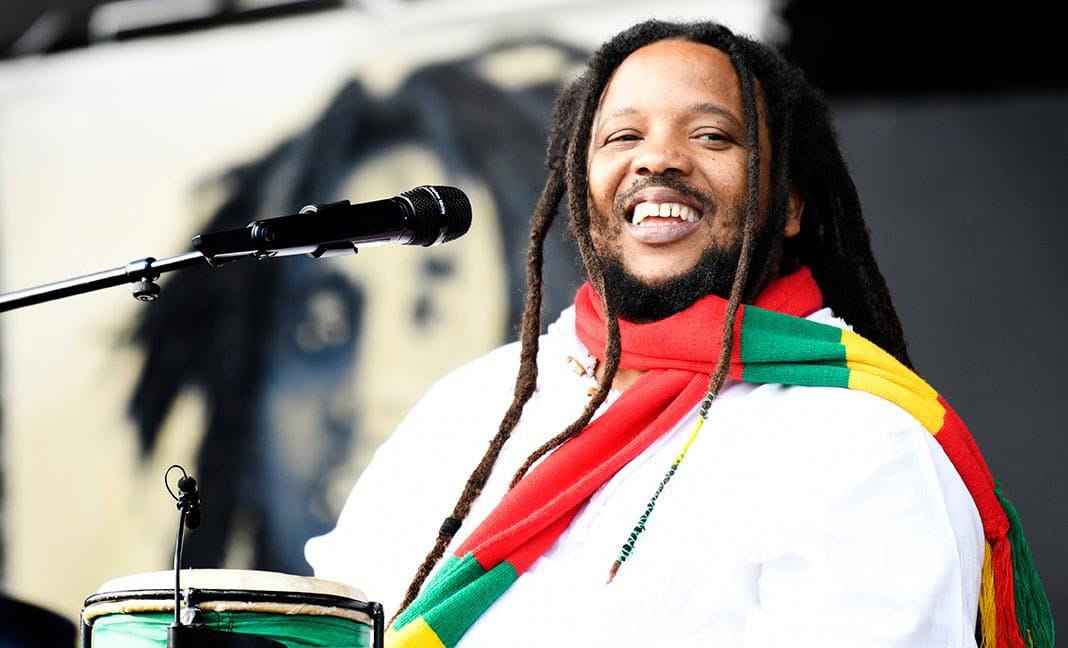Global Beat: Stephen Marley

Stephen Marley has long been called an old soul, though he’s still not entirely comfortable with that descriptor.
“I won’t say that I consider myself an old soul, but I’ve always been considered an old soul,” Marley says with a laugh, while describing the title of his first studio set since 2016, Old Soul. “Even my song ‘Old Soul’ says, ‘So they say.’ It’s not me saying that. It’s them saying it. But, I was privileged to be amongst the elders at a very young age—around my dad and The Wailers. I’ve always been in the mix there, falling asleep in the rehearsals. I’ve adapted some of the traits and some of the wisdom that I was around.”
The Florida-based reggae singer, who is the second-oldest son of Bob and Rita Marley, started working on what eventually became Old Soul in 2020, during the depths of the pandemic. With the live-music world temporarily shuttered and his plans to work on a new studio album paused, Marley retreated to his makeshift garage studio on his farm, simply to jam.
“I wasn’t [working on] anything specific. I was just happy to be in a space where we could breathe again, so to speak,” Marley says. “The music started coming out. It was about starting to play music again.”
Marley was joined in the studio by his guitarist Ranoy Gordon and engineer Adiambo Riley. The musicians spent time “acoustic jamming” on a mix of nascent ideas and soul-cleansing covers to help get them through the shutdown, before realizing that they had the seeds of a new studio project. Then, they started reaching out to a mix of friends and family members to contribute from afar.
“I thought that people would appreciate the spirit, this vibe—just something to help them get through the day,” Marley says of the often[1]mellow, soothing set of music. “I was like, ‘We’re not going to do the album we wanted to do, but here are some acoustic jams that I think people will appreciate in the meantime.’”
Once he started working on Old Soul more formally, Marley felt it was especially important for his siblings to contribute, and the final product features appearances by his older brother Ziggy and his youngest brother Damian, a frequent collaborator onstage and in the studio.
“Ziggy is the elder who raised us as a father figure,” says Marley, who has also clocked in time with his brother’s Melody Makers. “So that’s special for me. Ziggy is over in the West, and I am in Florida. We see each other not as often as we used to, as I want to. And COVID pushes you further because you’re not leaving home. When I had the chance to finally go and see him, I had a bit of the music already, so I played ‘Reward’ for him. I said, ‘This is the one I would like for you to jam, man.’ With Damian, we have that relationship where he’s always right there with me and vice versa. This thing wasn’t hard for us to pick up on.”
The final version of Old Soul also includes a few of the covers Marley had been toying around with during the pandemic, including Ray Charles’ “Georgia on My Mind” and an arrangement of “Don’t Let Me Down” that was inspired by Marcia Griffiths’ take on the 1969 Beatles B-side. The LP also boasts a cover of Bob Marley’s “I Shot the Sheriff,” which, of course, Eric Clapton famously reworked in the ‘70s. Slowhand reprises his role on the new album, continuing his long-standing relationship with the Marley family.
“I met Eric Clapton when I was doing one of my father’s songs that was unreleased officially, ‘Slogans,’ and he came and overdubbed some guitar,” Marley says. “He had some music he was working on at the same time and asked me to play some percussion. We had a good time, and I got to know him. His ‘I Shot the Sheriff’ brought my dad to a new audience. This one was a jam at first and it evolved.”
Elsewhere, Old Soul boasts contributions from members of Slightly Stoopid—who have been in the Marley brothers’ orbit since 2004’s Roots, Rock, Reggae Festival—and Bob Weir and Jack Johnson, both of whom lent their services to the original “Winding Roads.” A left turn from the recording techniques he used for much of the album, Marley traveled to Weir’s TRI Studios to work with the Grateful Dead co-founder and his Wolf Bros combo.
“It was already a song that I had,” he says. “That’s the only song on the record with a full drum set. All the other songs have hand drums and acoustic instruments. This was more like a song that would be for the next album. We went to the studio; the great Don Was was there, and we jammed it out. We’ve been with the Dead for a while. When Jerry passed away, I remember going up and giving our condolences and paying homage to him. They went about their music in an organic way and built a fanbase in that organic way. And, to this day, its is one of the greatest fan bases out there.”
Looking ahead, Marley hopes to circle back to the studio project he was eyeing in early 2020, before the pandemic. But, until then, he is enjoying being back on the road, running through a mix of original music and his father’s classics.
“It is heaven being able to do what we do and express ourselves the way we express ourselves,” he says. “Nothing beats a live show. Nothing beats that live interaction with the people and the music. There’s no stopping, rewinding. It’s healing right now. The music is what’s helping me and the people. It is showing us all love.”




















